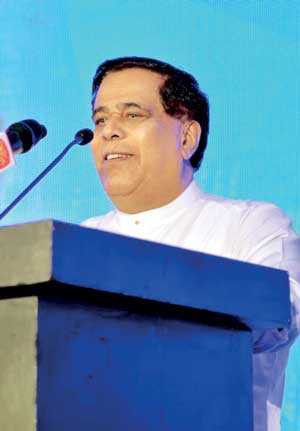Tuesday Feb 17, 2026
Tuesday Feb 17, 2026
Monday, 12 November 2018 00:00 - - {{hitsCtrl.values.hits}}



The Chartered Institute of Logistics and Transport (CILT) Sri Lanka hosted its Annual International Conference (IC) 2018 titled ‘Staying Relevant in a Digitally Connected Future’ in Colombo recently focusing on the impact of disruptive technologies on logistics and transport, where experts shared insights on how new trends, including robotics, autonomous vehicles, drones, blockchain, artificial intelligence (AI) and big data affect the sector.
In the opening remarks of the conference, CILT Sri Lanka Chairperson Gayani De Alwis pointed out that CILT is the only chartered professional body in Sri Lanka for professionals engaged in transport, logistics and supply chain. “We are celebrating 100 years next year. We have a global presence with over 34,000 members, in 34 countries. We cater to both passenger and freight transport and related infrastructure in land transport, maritime, aviation and supply chain and logistics.”
“The main objective of CILT IC is to bring together the logistics and transport fraternity to expose them to new developments in the industry through an expert panel of speakers and to provide networking opportunities. CILT always keep abreast with the latest trends and address these through topical themes to create awareness among our membership at our IC. 
“We are in times of great change as well as challenges. Digitally driven disruptions are changing our lives and the way we do business. Digital connectivity is transforming transport, logistics and supply chain. Hence, our theme for this year’s international conference, ‘Staying Relevant in a Digitally Connected Future’.”
She thanked the Minister of Transport and Civil Aviation for having accepted the invitation as the Chief Guest. She expressed her gratitude to him for the support by his presence at the CILT Sri Lanka’s inaugural National Excellence Awards and sought support in the forthcoming Transport Day, which CILT Sri Lanka intends to organise with the support of the ministry. She also mentioned the need to improve Sri Lanka’s global standing in the transport and logistics sector as the recent World Bank’s Connect to Compete report, Sri Lanka has been ranked 94 out of 186 in the 2018 LPI ranking, which needs to be improved as a priority to improve logistics competitiveness.
She stressed that CILT Sri Lanka understand the role a professional body should play to improve the logistics friendliness of the country and are ready to work with other trade bodies and government agencies to support the government’s development agenda to improve the logistics and transport industry to improve Sri Lanka’s global ranking.
“We have seen new digital entrants like Alibaba, Airbnb, Uber and our very own PickMe and Kapruka, etc. are challenging the established and winning. Humans, on average touch the mobile 300 times a day, not only to make calls but to do many other things like paying the bills, buying goods, tracking our route, etc. In the world of IoT, our refrigerators will decide and order things by observing our consumption patterns.”
“When you need something, one can order on line and it gets to your doorstep in few minutes through drone delivery. We are seeing rail travel at 300 km/h. Yet in Sri Lanka we are still between an analog and a digital world experiencing the discomfort of the former and hoping for the latter. To stay relevant means we understand what is available, what scenarios are emerging and what we need to do for the change to happen. In CILT Sri Lanka, we want to ensure that our membership stay current and relevant and our members who are the leaders in the industry here are equally equipped to bring about the desired change. We can’t sit at the side, but need to be at the centre and embrace the change to transform our selves through digitalisation, which is a great equaliser for a small island nation like SL. We must disrupt ourselves before we get disrupted,” she opined.
The sessions that followed included presentations by eminent thought-leaders and industry experts.
Professor Rohan Samarajiva delivered the keynote oration titled ‘ICT contribution to Sri Lanka’s and the region’s logistics sector’, by sharing his thoughts on current/potential digitalisation changes that are taking place in Sri Lanka in relation to the local logistics and transportation industry.
Ravind Mithe, Principal Consultant from KPMG, delivered an insightful presentation ‘Supply Chain for a Digital World’ full of empirical evidence and data from various studies and his thoughts on the benefits of digitalisation for the global logistics and transport industry.
Rodrigo Reyes, Regional Manager – Airports, Passenger, Cargo and Security – Asia Pacific for IATA presented on ‘Simplifying Aviation Business’ elaborating on the digitalisation of the aviation sector. Eva Chang – Head of International Business – Dagang Net Technologies Sdn Bhd explained ‘Malaysia’s Journey to National Single Window’ sharing details on port digitalisation and the concept of single window from a Malaysia perspective.
Dr. Ashan Amarasinghe’ s presentation on ‘Mass customisation driven connectivity and the emergence of integrated smart logistics’ covered his thoughts on the digitalisation and technology usage in the land transport sector in Sri Lanka.
David Houser – Senior VP, International Sales & Operations – HighJump ‘Digitalisation and technology within the supply chain’ explained his experience on the digitalisation and technology usage in warehouse operations and management.
The Chartered Institute of Logistics and Transport (CILT) is a leading global professional body associated with the logistics and transport industry. The Institute holds unparalleled international recognition and works towards achieving its objectives of promoting and encouraging the art and science of logistics and transport through its membership and its educational qualifications. With a global membership of over 34,000 from 34 countries across the globe, CILT provides a professional identity to those in the ever expanding logistics and transport sector. It is a strong, active and a unified professional association that is able to speak with authority on strategic issues affecting businesses and people in the industry and support their careers.